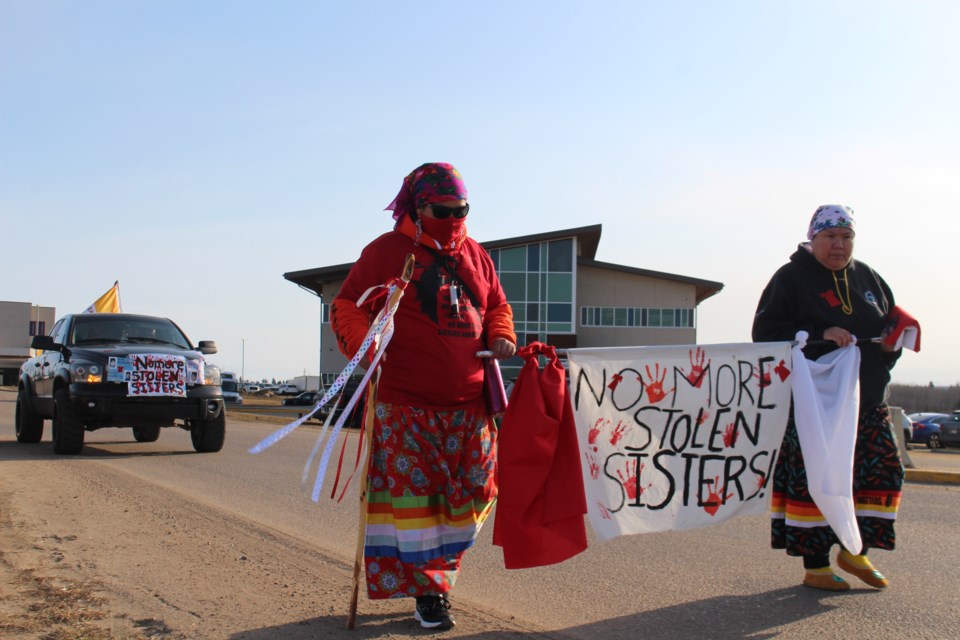COLD LAKE – It started as anger, said Wendy Watchmaker. Then it grew into action.
The mother of six and a caretaker to two of her nieces, has made the decision to walk over 300 km to raise awareness about Murdered and Missing Indigenous People (MMIP) who have been killed or disappeared in Canada.
What moved her to action was the most recent discovery of an Indigenous woman’s body being found in a Winnipeg landfill earlier this month.
On April 6, Winnipeg police declared that there was no evidence to suggest foul play in the death of Linda Mary Beardy. Police cited video surveillance showing the 33-year-old mother of four and member of Lake St. Martin First Nation had climbed into a commercial garbage bin prior to the it being emptied and transported to the landfill where her body was later discovered.
Like Beardy’s family, Watchmaker was not impressed with the overall investigation. The tragic death was also far too reminiscent of other recent tragedies that have come to light in Winnipeg landfills.
The discovery of Beardy's body came months after a Winnipeg waste management facility was closed for several weeks amid protests calling for a site-wide search for the remains of missing women.
Last June, the partial remains of Rebecca Contois were found there. Contois is one of four Indigenous women who police allege were all killed by the same man, Jeremy Skibicki. Morgan Harris and Marcedes Myran are also alleged victims.
Investigators still don't know the location of the remains of a fourth woman who they believe was also killed by Skibicki. The name Mashkode Bizhiki'ikwe, or Buffalo Woman, has been given to the unknown victim.
“They found a body and then they didn't really investigate it. Then there was a second body that was found,” said Watchmaker, thinking back to the news report of when the remains were first discovered last year.
“I started thinking, I'm scared to be native. I'm scared to be brown. I wish I wasn't native, and I wish my kids weren’t a native.”
As a member of Kehewin Cree Nation and Onion Lake Cree Nation, Watchmaker has deep pride in her Indigenous heritage, but feels it creates a target for people who want to cause harm.
“I don't know what people see when they look at us. Do we look like garbage? Do we look like easy targets? Do we look like somebody to be taken advantage of and murdered? Stuffed in suitcases and treated like a dead carcass?” she questioned.
Referencing the final report of the National Inquiry into Missing and Murdered Indigenous Women and Girls, Reclaiming Power and Place, Watchmaker said, “In recent decades, at least 4,000 Indigenous women and girls have been murdered, or simply vanished.”
This is what sparked Watchmaker to action and why she decided she would walk from Hotel Dene on Cold Lake First Nation to Papaschase Reserve over a span of six days.
“It's been on my mind for a while, but just this past week I knew I had to take action. My kids, they are going to have to live in this world when I'm not here anymore,” she said. “What is it going to take to get awareness out in our region about the number of MMIP? What is it going to take for people to wake up, to rise up, to get justice for people.”
Watchmaker started her journey on Friday morning and is expected to arrive in Papaschase by April 26, walking between 40 and 55 km per day.
As she has walks, people have joined her for portions of the journey, to share and show their support for her mission. As a mother, Watchmaker says she is walking for the families of those whose loved ones are missing or murdered, but also for the victims themselves.
She is walking to protest child trafficking and human trafficking, to reinforce that every child and every life matters. She is doing it for the next generation.
“I want people to know that we shouldn't be scared to be native. I want them to know that we are here and to rise up and to warrior up. Protect their children, protect their sisters, protect their brothers, protect anybody whenever they see that they need help.”
The cycle of violence against women must stop, she said. The effect of generational trauma is wounding too many.
As Watchmaker continues her journey on Highway 28, she will be praying, smudging and laying down tobacco along the way.



